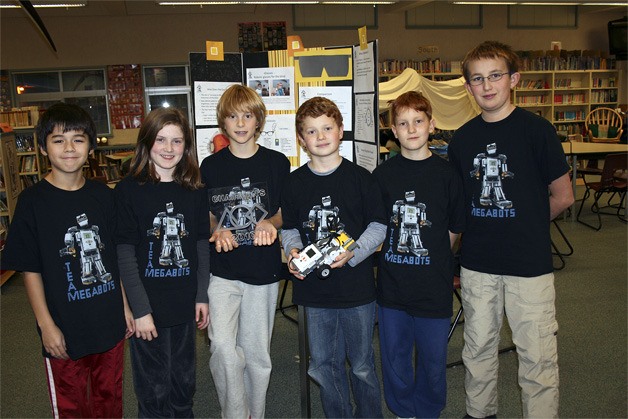The challenge to think like little scientists or budding engineers was met head-on by Team Megabots in the FIRST LEGO League regionals on Saturday, Dec. 4, in Seattle. The team competed against 26 other teams from the Seattle area.
Team Megabots, which consists of Lakeridge Elementary students: Allison Bunker, Fletcher Doren, Will Frohlich, Bob Kaplan, Nathaniel Nichol and Aedan Tien, walked off with the big prize, The Champions Award, for their creation: iglasses, a device to assist the blind.
FIRST LEGO League is a robotics program for 9 to 14-year-olds, which is designed to get children excited about science and technology, teaching them valuable life and employment skills. FLL is the brainchild of Dean Kamen, who invented the Segway, among other things. The robotics part of the competition revolves around designing and programming LEGO Robots to complete tasks.
There are 15,000 teams worldwide in over 50 countries, said coach Diane Tien. Tien and co-coach Kevin Doren said they didn’t have high expectations because Team Megabots are on the young end of the age range (9-14) and this was their rookie year. All six kids on the team are 10 or 11 years old. They also got a late start, not beginning on their project until around Halloween.
The theme for this year’s competition was the human body.
“At first we were going to do diabetes and prosthetic limbs, but it evolved because Nathaniel has a neighbor with low vision,” said Frohlich.
Kaplan added that they know a few kids in the community who have missing limbs, so that was an inspiration as well.
But Bunker, who was interested in blindness, said it just sort of evolved into the iglasses. She presented her concept to the team and they embraced it.
The iglasses, of which they built a prototype, use a series of ultrasonic sensors to detect the variable ground surfaces, much like a cane, giving audio feedback to the person wearing them. The glasses would also have a built-in GPS unit which would allow the blind person to determine where they are going and where they are at any given time. The GPS software would use voice recognition. Lastly, the glasses would include a phone and a small camera built in so that a video feed could be sent to a friend or caregiver to help identify location or other visual information.
Team Megabots competed in the Western FLL championships on Dec. 11, this year held in Spanaway, Wash. The team placed 17 out of 40, very good for a rookie team. The team intends to compete in next year’s challenge and possibly take it to the next level when they get to high school, which is the First Technology Challenge.



